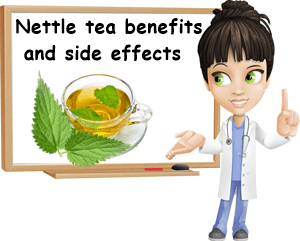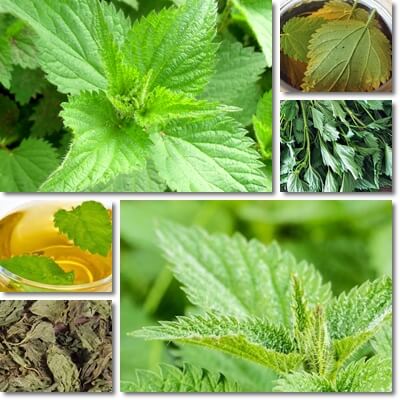Wintertime is a great time for drinking tea, so much so when you choose highly therapeutic options such as nettle tea. There are so many benefits to nettle tea, from exerting a diuretic and depurative action to providing astringent, anti-diarrheal properties and anti-inflammatory benefits. Nettle tea is known for its hemostatic potential, acting to stop bleeding, and hematopoietic action, stimulating the formation of the cellular components of blood which accounts for its uses in anemia management. A tonic and strengthening agent, nettle tea is a more than good choice for a herbal infusion, and it actually tastes good in addition to being a source of important benefits for health.
What is nettle tea?
Nettle tea is a herbal infusion made from the leaves, but also stems and even flowers of the common nettle or stinging nettle, known under the scientific name Urtica dioica. Nettle tea has a long history of use in traditional medicinal systems from around the world owed, in part, to the widespread natural range of the plant and, in part, to its medicinal properties. The herbal infusion can be made from just nettle leaves or the entire aboveground part of the plant (leaves, stems, flowers). Fresh or dried, whole, chopped or finely ground plant parts may be used to make nettle tea.

What does nettle tea look like?
Nettle tea made from fresh nettle typically has a brownish-green color, whereas nettle tea made from dried nettle can range in color from a light brownish-yellow to an orangey or reddish-brown to dark amber if concentrated. If the dried nettle material is relatively fresh, that is, recently harvested and processed (dried), there may be a greenish tinge to the tea. If you are looking to buy nettle tea, know that you can find it at your local supermarket, in health food stores, or at the farmers market. Nettle tea is available as loose leaf or boxed tea bags.
What does nettle tea taste like?
Does nettle tea taste good? The taste of nettle tea varies depending on the ratio of nettle-to-water and the type of nettle material, fresh or dried. Nettle tea made from fresh nettle has green flavors with a spinach or patience dock-like aroma and pregnant grassy notes. Nettle tea made from dried nettle is not grassy-tasting, but rather has a stronger, herbal taste with muted bitter flavors and earthy tones. The more dried nettle you use per cup and the longer you steep it for, the more pregnant the bitter flavors. And no, nettle tea does not sting.
To make it taste better, you can always add fresh lemon juice, orange juice, mandarin orange or clementine juice, your favorite raw honey varieties, maple syrup or sugar, or mix it with other tea herbs (rose hip tea, rooibos tea, orange tea, berries tea etc.). Or you can make a nettle maceration extract, chill overnight in the fridge and add naturally sparkling water, citrus juice and fresh fruits to it.

Nettle tea uses
Historically, nettle tea has been used both externally, for cosmetic purposes and maintaining hygiene, and internally, for its wide range of medicinal benefits. Here are the top uses of nettle tea:
External uses:
- Uses in hair care: combating hair loss, strengthening hair, maintaining scalp health.
- Uses in bleeding disorders: in a sitz bath to relieve discomfort and stop bleeding from hemorrhoids.
- As a mouth wash, to help with bleeding gums.
- As a skin wash for its antibacterial action.
Internal uses:
- For: arthritis pain relief, reducing bleeding, lowering high blood sugar levels, stimulating breast milk production, supporting kidney health and kidney activity, lowering blood pressure, stopping diarrhea and rehydrating the body, boosting the immune system response and strengthening the body.
Nettle tea benefits
Diuretic and depurative action
Nettle tea has natural diuretic properties, increasing urine output and supporting normal kidney function and kidney health, with additional benefits for the prevention of urinary tract infections.. As a diuretic, nettle tea also exerts a depurative action and supports the body’s natural detoxification mechanisms.
Benefits for diarrhea
Nettle tea has natural astringent properties and can help relieve diarrhea. It also helps replenish lost fluids and combat dehydration caused by diarrheal episodes.
Benefits for nursing mothers
Although nettle tea isn’t safe to drink during pregnancy, it is good for after the pregnancy. Nettle is a known galactagogue, stimulating prolactin secretion and breast milk production in nursing mothers.
Antianemia benefits
Nettle tea isn’t rich in iron, vitamin B12 or other B vitamins that actively combat anemia, but it has antianemia benefits nonetheless. Nettle tea has a hematopoietic action, stimulating the formation of the cellular components of blood and thus helps combat anemia.
Anti-hemorrhagic action
Nettle tea has been used internally and externally as an anti-hemorrhagic agent. The tea has astringent properties, constricting body tissues in order to stop the flow of blood, resulting in hemostatic benefits. Nettle as food also acts as a hemostatic, stopping bleeding, and does so with the help of a high content of vitamin K1. Historically, nettle has been used to treat nosebleeds, bleeding caused by hemorrhoids, abnormal or excessive bleeding in women of childbearing age and even hemophilia.
Selective hepatoprotective action
Not only is nettle tea not hepatotoxic, but studies show that it also exhibits protective effects against acetaminophen-induced hepatotoxicity (source). It however enhances ethanol-induced hepatotoxicity which means it is not a good idea to drink nettle tea if you are consuming alcohol.
Benefits for diabetes
Nettle tea has antihyperglycemic properties, lowering high blood sugar levels, with benefits for diabetes. According to research, bioactive components in nettle leaves stimulate insulin secretion which is responsible for moving sugar from the blood into liver cells and fat cells, thus lowering levels of sugar in the blood. Moreover, nettle leaves also inhibit alpha-glucosidase in the intestines which increases digestion time and delays carbohydrate digestion, lowering rates of sugar absorption in the blood. Preliminary research further suggests nettle may also improve efficacy of conventional oral antihyperglycemic drugs to control glycemia in diabetes.
Organic tea
Nettle is somewhat of a weed: an extremely resilient plant that does not require pesticides. So whether the nettle leaf is sourced from the wild or comes from conventional agriculture, it likely grew naturally, organically, making nettle tea organic as well. Of course, there are exceptions, such as nettle sourced from polluted areas, industrial areas, roadsides etc.
Tonic, strengthening agent
Nettle tea hydrates the body and provides very small amounts of several dietary minerals and electrolytes such as magnesium, potassium, iron, even calcium, sodium and manganese with a tonic action, strengthening the body.
Potential benefits for menopause
There is a report of nettle tea being identified as the cause for gynecomastia in a man and galactorrhoea in a woman which has lead researchers to postulate that nettle tea and other nettle products such as extracts may have estrogenic effects which could recommend the plant as a natural adjuvant in menopause.
Pain-relieving properties and anti-arthritis benefits
Research shows nettle and nettle tea contain kynurenic acid which is a metabolite of kynurenine possessing anti-inflammatory, anti-oxidative and pain reliving properties (source). Regular consumption of nettle tea can potentially help reduce inflammation in rheumatic disease and mitigate arthritis pain. Historically, hot nettle poultices were applied to joints to help relieve rheumatic pain.
Benefits for hair and scalp health
Using nettle tea, maceration or extract for washing hair can help strengthen hair and reduce hair loss as well as maintain scalp health.
Minor benefits for high blood pressure
Nettle tea contributes to blood volume and provides very small amounts of electrolytes such as magnesium and potassium, as well as anti-inflammatory and stress-reducing bioactive components which may contribute with minor benefits for high blood pressure.
Antioxidant properties with anticancer potential
Biologically active phytochemicals in nettle and nettle preparations scavenge for free radicals and help combat, reduce and repair damage produced by oxidative stress. Additionally, agents such as flavonoids and phenolics, mainly patuletin, m/p-hydroxybenzoic acid, and caffeic acid, among others, exhibit pro-apoptotic and anti-tumor effects that account for the anticancer potential of the plant (source).
Nettle tea does not cure tuberculosis, treat allergic reactions, hay fever, osteoporosis, nor does it strengthen bones. Nettle tea does not purify blood, does not help easy labor pains, and is not rich in vitamins and minerals. At most, it may contain trace amounts of a few water-soluble vitamins, some of which will be affected by thermal processing (boiling or steeping in hot water), and very small amounts of several dietary minerals and electrolytes. But nettle tea is not nearly as nutritious as nettle leaf consumed as food.
Nettle tea side effects
- Allergic reactions. Like all foodstuff, nettle and nettle tea too can cause allergic reactions with the potential for anaphylactic shock. Cross-contamination with other allergenic plants can also be a source of allergic reactions.
- Increased risk of miscarriage. Nettle tea is contraindicated to pregnant women because it has the potential to cause a miscarriage. Risks of pregnancy loss are high if intake is excessive or continual.
- Toxicity or poisoning can occur if nettle tea material is contaminated with plants not safe for human consumption or poisonous plants. Risks are extremely rare for commercial nettle tea and only one such case is reported.
- Heavy metals contamination. Nettle tea material can potentially be contaminated with heavy metals if the plant is sourced from a polluted area (e.g. near a roadside, in the proximity of a factory, from an urban environment or soil to which intensive agricultural practices have been applied). Other herbal teas run the same risks.
